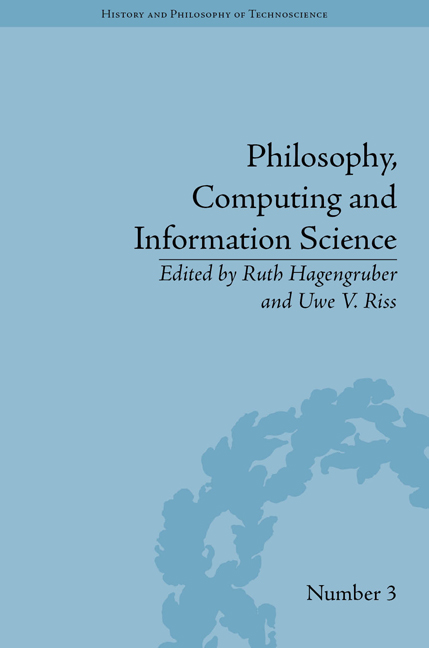Book contents
- Frontmatter
- CONTENTS
- List of Contributors
- List of Figures and Tables
- Introduction: Philosophy's Relevance in Computing and Information Science
- Part I Philosophy of Computing and Information
- 1 The Fourth Revolution in our Self-Understanding
- 2 Information Transfer as a Metaphor
- 3 With Aristotle towards a Differentiated Concept of Information?
- 4 The Influence of Philosophy on the Understanding of Computing and Information
- Part II Complexity and System Theory
- Part III Ontology
- Part IV Knowledge Representation
- Part V Action Theory
- Part VI Info-Computationalism
- Part VII Ethics
- Notes
- Index
4 - The Influence of Philosophy on the Understanding of Computing and Information
from Part I - Philosophy of Computing and Information
- Frontmatter
- CONTENTS
- List of Contributors
- List of Figures and Tables
- Introduction: Philosophy's Relevance in Computing and Information Science
- Part I Philosophy of Computing and Information
- 1 The Fourth Revolution in our Self-Understanding
- 2 Information Transfer as a Metaphor
- 3 With Aristotle towards a Differentiated Concept of Information?
- 4 The Influence of Philosophy on the Understanding of Computing and Information
- Part II Complexity and System Theory
- Part III Ontology
- Part IV Knowledge Representation
- Part V Action Theory
- Part VI Info-Computationalism
- Part VII Ethics
- Notes
- Index
Summary
Basic Concepts and the Development of Modern Information and Communication Technology
What we consider to be the influence of philosophy on scientific thinking largely depends on how science perceives itself. The understanding and conscious human-oriented design of the relationship between the computer and the creatively active person – i.e. the design of a formal model and the non-formal, natural and social environment – is always more readily recognized as the fundamental philosophical, theoretical and methodological problem of informatics (computer science and information systems).
Informatics/computer science results from the necessity to overcome the tension between technology-based automation, which is based on a purely syntactic interpretation and transformation of information, and creative and active people who carry out semantic information processing based on their knowledge. It is this tension that requires the development and use of user-oriented software and the formal operations to be integrated into complex human work processes. Conceptual strategies that foster the development and integration of modern information technologies into social organization are currently the topic of vivid philosophical and methodological discussions, reflecting the influence of different philosophical schools.
The utilization of information technologies has significantly changed both employee working conditions and the relationship between organizations and their environment. The development of humanity-oriented computer science is a necessary condition for integrating computational systems into social contexts and for largely adapting these systems to the users' needs.
Information
- Type
- Chapter
- Information
- Philosophy, Computing and Information Science , pp. 45 - 56Publisher: Pickering & ChattoFirst published in: 2014
